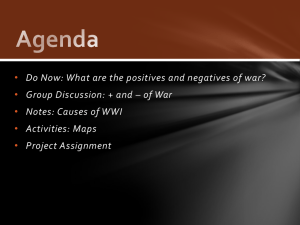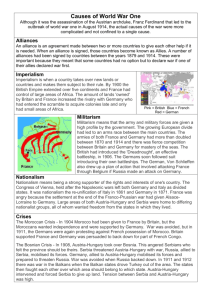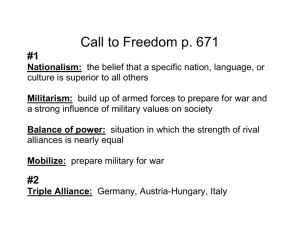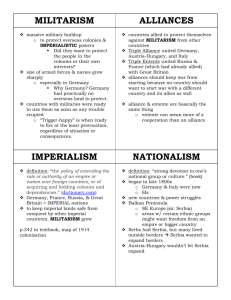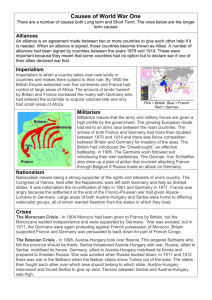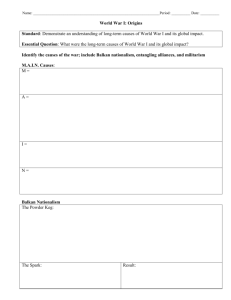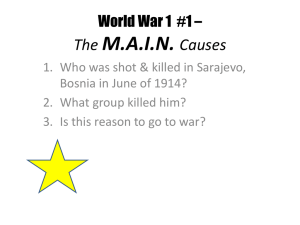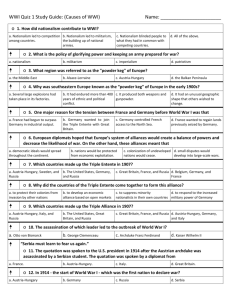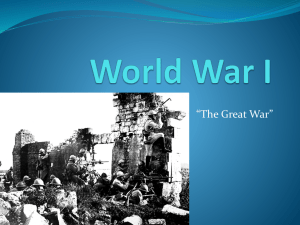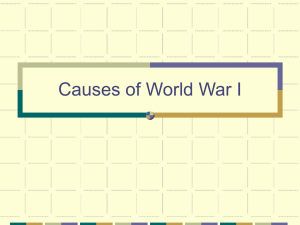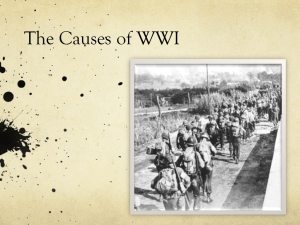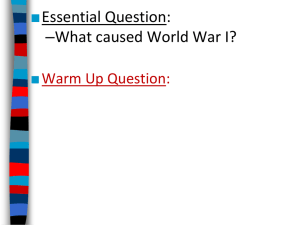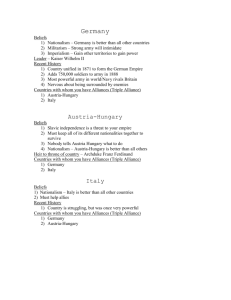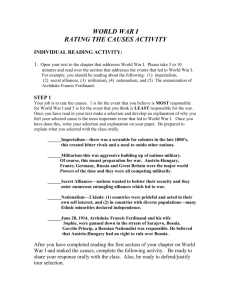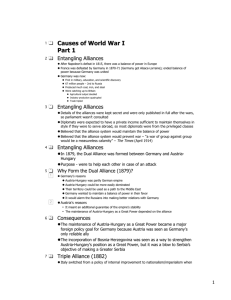Causes of World War One - Millie
advertisement
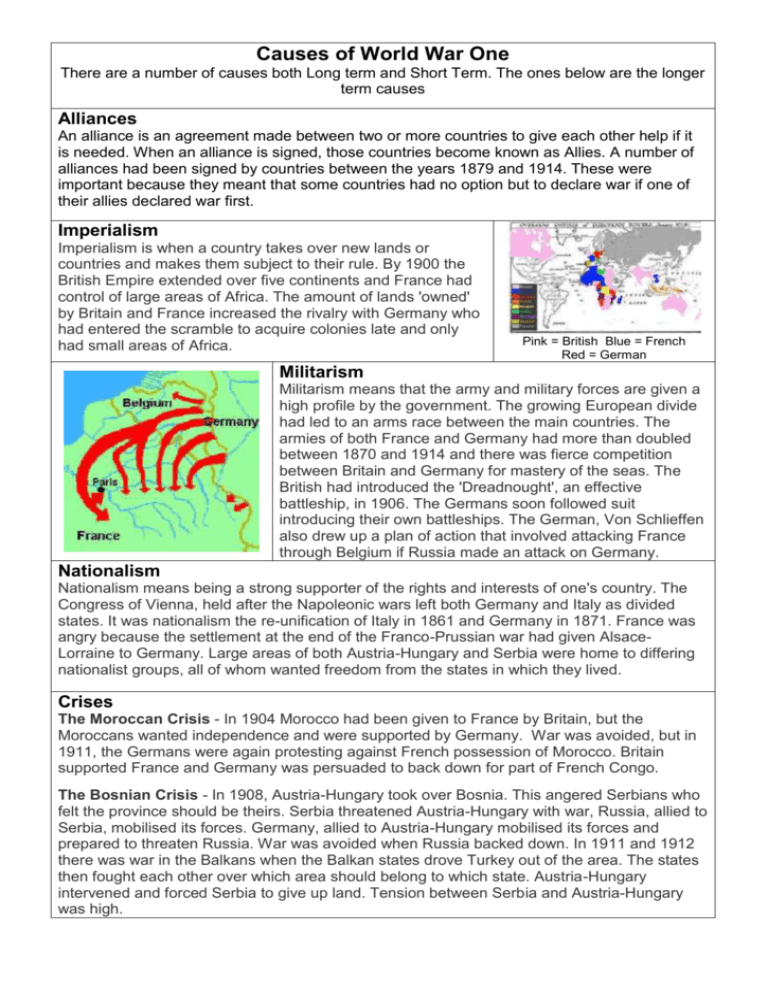
Causes of World War One There are a number of causes both Long term and Short Term. The ones below are the longer term causes Alliances An alliance is an agreement made between two or more countries to give each other help if it is needed. When an alliance is signed, those countries become known as Allies. A number of alliances had been signed by countries between the years 1879 and 1914. These were important because they meant that some countries had no option but to declare war if one of their allies declared war first. Imperialism Imperialism is when a country takes over new lands or countries and makes them subject to their rule. By 1900 the British Empire extended over five continents and France had control of large areas of Africa. The amount of lands 'owned' by Britain and France increased the rivalry with Germany who had entered the scramble to acquire colonies late and only had small areas of Africa. Pink = British Blue = French Red = German Militarism Militarism means that the army and military forces are given a high profile by the government. The growing European divide had led to an arms race between the main countries. The armies of both France and Germany had more than doubled between 1870 and 1914 and there was fierce competition between Britain and Germany for mastery of the seas. The British had introduced the 'Dreadnought', an effective battleship, in 1906. The Germans soon followed suit introducing their own battleships. The German, Von Schlieffen also drew up a plan of action that involved attacking France through Belgium if Russia made an attack on Germany. Nationalism Nationalism means being a strong supporter of the rights and interests of one's country. The Congress of Vienna, held after the Napoleonic wars left both Germany and Italy as divided states. It was nationalism the re-unification of Italy in 1861 and Germany in 1871. France was angry because the settlement at the end of the Franco-Prussian war had given AlsaceLorraine to Germany. Large areas of both Austria-Hungary and Serbia were home to differing nationalist groups, all of whom wanted freedom from the states in which they lived. Crises The Moroccan Crisis - In 1904 Morocco had been given to France by Britain, but the Moroccans wanted independence and were supported by Germany. War was avoided, but in 1911, the Germans were again protesting against French possession of Morocco. Britain supported France and Germany was persuaded to back down for part of French Congo. The Bosnian Crisis - In 1908, Austria-Hungary took over Bosnia. This angered Serbians who felt the province should be theirs. Serbia threatened Austria-Hungary with war, Russia, allied to Serbia, mobilised its forces. Germany, allied to Austria-Hungary mobilised its forces and prepared to threaten Russia. War was avoided when Russia backed down. In 1911 and 1912 there was war in the Balkans when the Balkan states drove Turkey out of the area. The states then fought each other over which area should belong to which state. Austria-Hungary intervened and forced Serbia to give up land. Tension between Serbia and Austria-Hungary was high. Activities – The Long Term Causes of WW1 Use the information on the left and further research of your own to determine the following. 1. The two main alliances at the time were called the Triple Entente and the Triple Alliance. Which countries belonged to each, and why was this such a difficult situation. The Triple Alliance had the countries Germany, Austria-Hungary and Italy. In the Triple Entente the countries were Russia, France and Britain. This was a difficult situation because if one country in an alliance declared war, then all the other countries in that alliance would have to help that country. 2. How did imperialism contribute towards Germany’s increasing anger with Britain and France? Imperialism contributed towards Germany’s increasing anger with Britain and France because, Brittan had more than Germany. Germany then realised that they were becoming more powerful and they were becoming jealous of Brittan. 3. Why was nationalism an important factor? Nationalism is an important factor because without it people would not believe in their country. If nobody believed in their country then they would not help fight for their country or 4. Describe the part played by Germany in increasing European militarism. When they increased they started like a race to see who had more or better equipment like for example the British had brought out the 'Dreadnought', an effective battleship, in 1906. 5. What links were there between the two crises and: a. Alliances: The link between Alliances and the Crisis is the country’s felt like they had support when they wanted independence so there were no wars and they were avoided. Without the alliances the other countries would have declared war but they didn’t because the alias helped mobilised its forces and help them prepare for war. b. Imperialism: The link between imperialism and the Crisis in Morocco was that Morocco was governed and ruled by France. Morocco wanted independence and freedom. Luckily war was avoided but Germany was persuaded to back down but Morocco still did not get independence. The link between imperialism and the Bosnian Crisis is that Austria-Hungary had control over Bosnia. Serbians wanted control of Bosnia but did not get it when Russia decided not to fight in the war to get control of Bosnia. c. Militarism: The link between militarism and the Moroccan Crisis is that Britan’s army were alot stronger then Germany’s army and because of this they had to be forced to back down from fighting for Morocco’s freedom. The link between the Bosnian Crisis and militarism is that when Germany and Austria-Hungary allied they formed a stronger army then Russia and Serbia. This caused Russia to back down from the war.
